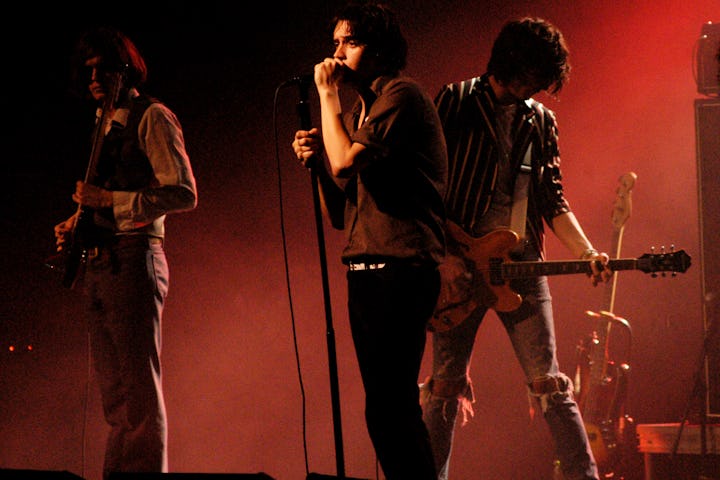20 Years Ago, The Best Rock Band In The World Leveled Up With A Perfect Album
Yeah, the night’s still not over. Here’s how The Strokes’ Room on Fire feels two decades later.

The best live rock band of the first decade of the 21st century was The Strokes. To be clear, The Strokes are still a wonderful live band in 2023, but if you saw The Strokes somewhere between the release of their first album This Is It in 2001 and their third album First Impressions of Earth in 2006, you saw the greatest concert on the planet. My bias on this is very strong, because I saw The Strokes three times during this period, twice in their hometown of New York City. For a brief moment, there was a renaissance of old-school guitar in NYC, and in those days, before a “hipster” became a full-on slur, The Strokes were the kings of everything cool.
Smack-dab in the middle of this period was the 2003 album Room on Fire, the second studio album from the band, which, at the time of its release was a make-or-break record in terms of their credibility. If you saw The Strokes live in 2002, they often didn’t play an encore because they simply didn’t have any extra songs. But, by 2005 and 2006, they had plenty. And, arguably, all their highest-quality songs come from Room on Fire, even though, in most conventional ways, this album totally lacked a crowd-pleasing hit single. Which is why it’s so rad. Room on Fire dropped on Oct. 28, 2003, and it’s still amazing today because it’s basically an entire record of deep cuts.
Ostensibly, the lead single for the album was “12:51,” which recalled the brighter, jauntiness of “Someday” from their first album. Released just a few weeks before Room on Fire, “12:51” was possibly a song that misrepresented Room on Fire but also hinted at the layered nature of what was to come. The entire story of “12:51” is about somebody who doesn’t really want to get going and go to a specific party, or maybe over to someone’s house to just chill. “F*ck goin’ to that party,” Julian Casablancas croons, even though the song concludes with the admission that we’re gonna get it together and leave the house after all when he says, “All right, I’m coming. I’ll be right there.”
This push-and-pull of a never-ending night out (or in?) is the microcosm for why Room on Fire is so freaking amazing. “12:51” might scan as a bouncy single (with a slick Tron-inspired video), but it’s really part of an overall tapestry to the record. On what is surely the best song on the album, “Reptilia,” we’re told the “night’s not over,” because we’re not “trying hard enough.” And, of course, the penultimate track, “The End Has No End,” hits the themes of the record on the nose pretty hard — this record is all pretty much one song, not 11, which is why there’s not a snappy single like “Last Nite.”
Sonically, Room on Fire is somewhere in-between the garage-rock-near-punk quality of the first album but not quite the more pristine production of First Impressions. If the first album was a DIY tattoo, then the second album was at a tattoo parlor where you knew a guy but it was still a little shady. Overall, Room on Fire suggests that yes, this is still the same raw band that made Is This It, but they’ve decided to both be a little more professional and artistically indulgent at the same time.
Because, ultimately, the reason why Room on Fire is so good is that The Strokes weren’t trying to make a crowd-pleaser. I remember riding my bike to my local record shop in Tempe, Arizona — Stinkweeds — the day this album came out and sticking the CD in the waistband of my jeans for the ride home. I remember snapping it into a Discman I had hooked up to enormous speakers and blasting the whole thing for my roommates. Everybody felt the same way. It was most certainly a new Strokes record, and they were still, without question, the rock gods of the moment. But nobody could agree on their favorite track.
Julian Casablancas in 2003.
This is why Room on Fire is so unique. As the sophomore record of one of the most important bands of the century, you’d think there would be a consensus as to which song is truly the best. Arguably, this is true of the first Strokes album too, though I’d say most people would agree that “Last Nite” is the song that goes on the hypothetical golden record and shot into space to represent their entire oeuvre. Room on Fire provided no obvious demarcation of popularity or excellence.
The album’s three singles — “12:51,” “Reptilia,” and “The End Has No End,” — could have just as easily been selected as album tracks, and The Strokes could have dropped “Meet Me in the Bathroom,” “Whatever Happened?” or “The Way It Is” as singles. That’s how consistently good this album is and how much the album doesn’t give a f*ck about producing a radio-friendly hit.
In the world of great rock albums, we all like to say that there are perfect records that you can just put on back-to-front, and every single song is great. The thing is, with Room on Fire, The Strokes made that ideal album, but from the second you pressed play, to the last moment of “I Can’t Win,” it felt like no time had passed at all.
This article was originally published on